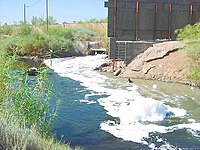
Photo from wikipedia
Background Agriculture is essential for food security. However, conventional agriculture alters the water and carbon cycle and soil properties. We investigated the effect of conventional management (CM) and sustainable management… Click to show full abstract
Background Agriculture is essential for food security. However, conventional agriculture alters the water and carbon cycle and soil properties. We investigated the effect of conventional management (CM) and sustainable management (SM) on the carbon and water cycle in crops of nopal (Np) and wheat (Wh). Methods A micrometeorological eddy covariance tower was installed to measure water use through evapotranspiration (ET) and the net exchange of CO2 during the crop’s development. Gross primary productivity (GPP), water use efficiency (WUE), and soil properties were obtained. Results The results showed that both agricultural managements influenced the carbon flux of the ecosystem, with a lower GPP and Reco in the nopal field (1.85 and 0.99 mmol C m−2 s−1, respectively), compared to the wheat field (6.34 and 1.8 mmol C m−2 s−1, respectively). It was mainly attributed to the metabolic plant differences, phenological stages, and wheat biomass developed during the winter. On the other hand, the accumulated ET in the SM-Wh plots was lower than SM-Np. Therefore, the crops subjected to sustainable practices use water more efficiently with 1.42 and 1.03 g C m−3 H2O for nopal and wheat, respectively. In regard to soil properties, it was observed that tillage alters microbial activity affecting organic matter and carbon. It can be concluded that the differences in agricultural management for both crops altered the carbon and water cycle and soil quality. In addition, implementing good agricultural practices allows more efficient use of water by the plant, higher retention of water in the soil, and less ET.
Journal Title: PeerJ
Year Published: 2022
Link to full text (if available)
Share on Social Media: Sign Up to like & get
recommendations!